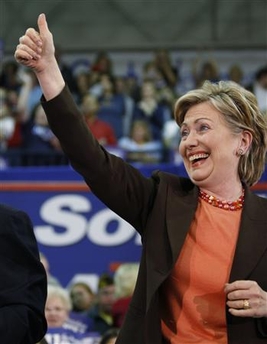Clinton wins W.Va., Obama still nomination leader
Updated: 2008-05-14 08:21
CHARLESTON, W.Va. - Hillary Rodham Clinton coasted to a large, but largely symbolic victory in working-class West Virginia on Tuesday, handing Barack Obama one of his worst defeats of the campaign but scarcely slowing his march toward the Democratic presidential nomination.
|
Democratic presidential candidate Senator Hillary Clinton campaigns during a rally at Logan Middle School in Logan, West Virginia, May 12, 2008. [Agencies] |
The Associated Press made its call based on surveys of voters as they left the polls.
Obama looked ahead to the Oregon primary later in the month and the general election campaign against Republican John McCain, but the defeat underscored his weakness among blue collar voters who will be pivotal in the fall.
"This is our chance to build a new majority of Democrats and independents and Republicans who know that four more years of George Bush just won't do," Obama said in Missouri, which looms as a battleground state in November.
"This is our moment to turn the page on the divisions and distractions that pass for politics in Washington," added the man seeking to become the fist black presidential nominee of a major party.
Interviews with West Virginians leaving their polling places suggested Clinton's victory could be as overwhelming as any she has gained to date, delivered by an overwhelmingly white electorate comprised of the kinds of voters who favored her in past primaries. Nearly a quarter were 60 or older, and a similar number had no education beyond high school. More than half were in families with incomes of $50,000 or less.
Clinton's aides contended that her strength with blue-collar voters — already demonstrated in primaries in Ohio, Pennsylvania and Indiana — makes her the more electable candidate in the fall.
"After tonight, we will have one more proof point, if you will, that Hillary Clinton is the strongest candidate Democrats can nominate," said Ann Lewis, an aide to the former first lady. "We're going to go back starting tomorrow and talk to those superdelegates who are still uncommitted and say, 'You know what? She is the candidate who expands the electoral map.' You look at West Virginia, you look at Kentucky, you look at Arkansas, you look at Tennessee. You look at what's at stake and that's a very powerful argument."
Clinton arranged a meeting with superdelegates for Wednesday.
She won at least 15 of the 28 delegates at stake in West Virginia, with 13 more to be allocated.
That left Obama with 1,875.5 delegates, to 1,712 for Clinton, out of 2,025 needed to clinch the nomination at the party convention in Denver this summer.
The delegate tally aside, the former first lady struggled to overcome an emerging Democratic consensus that Obama effectively wrapped up the nomination last week with a victory in the North Carolina primary and a narrow loss in Indiana.
He picked up four superdelegates during the day, including Roy Romer, former Democratic Party chairman.
"This race, I believe, is over," Romer told reporters on a conference call. He said only Clinton can decide when to withdraw, but he added: "There is a time we need to end it and direct ourselves to the general election. I think that time is now."
Clinton and Obama briefly shook hands on the Senate floor Tuesday after interrupting their campaigns for a few hours to vote on energy-related bills.
In the days since, close to 30 superdelegates have swung behind Obama, evidence that party officials are beginning to coalesce around the first-term Illinois senator who is seeking to become the first black to win a major party presidential nomination. Three of his new supporters formerly backed Clinton, who surrendered her lead in superdelegates late last week for the first time since the campaign began.
In his appearance in Cape Girardeau, Mo., Obama sketched the case against McCain. "For two decades, he has supported policies that have shifted the burden onto working people. And his only answer to the problems created by George Bush's policies is to give them another four years to fail," he said.
Tucker Bounds, a spokesman for McCain, said in response that Obama's rhetoric showed "more of the same negative, partisan politics that have paralyzed Washington for too long. Barack Obama talks about change and bipartisanship, but he has never showed the leadership needed to bridge party divides."
Clinton had spent parts of several days campaigning in West Virginia in search of victory.
She refrained from criticizing Obama directly, but had a cautionary word nonetheless for party leaders who seemed eager to pivot to the fall campaign. "I keep telling people, no Democrat has won the White House since 1916 without winning West Virginia," she said at Tudor's Biscuit World in the state's capital city.
Obama was in the state on Monday, but it was clear he was looking beyond the primary.
He said several days ago he expected Clinton to win by significant margins in West Virginia and then in Kentucky, which holds its primary next week. He devoted more time to Oregon, which also holds a primary next week, and announced plans to campaign in several other states that loom as battlegrounds in the fall against McCain.
Among them are Florida and Michigan, two states that held early primaries in defiance of national Democratic Party rules. The two combined have 44 of the 270 electoral votes needed to win the White House, and Obama has not yet campaigned in either.
Obama also broke from his usual practice by wearing a flag pin on his suit jacket. He told several thousand people at the Charleston Civic Center that patriotism means more than saluting flags and holding parades.
|
||
|
||
|
|
|
|





